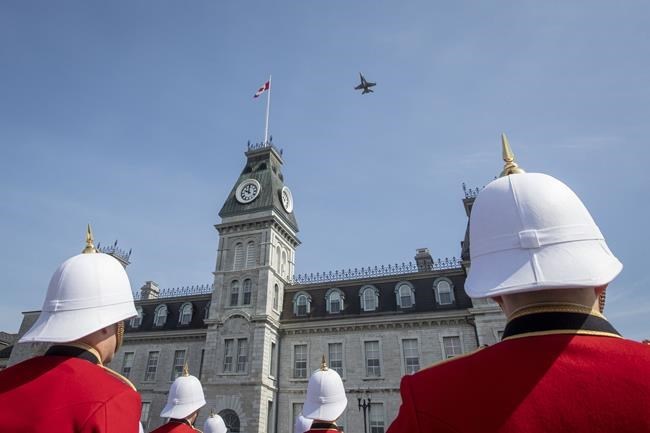OTTAWA — The majority of the board tasked with reviewing Canada's military colleges will be people who have not attended one of the schools and have not publicly expressed a strong opinion on their future, according to a recruitment posting.
A job posting on the Department of National Defence's LinkedIn page states that the seven-member board will include five people who are not members of the public service or National Defence and two members "from the defence team."
The five external recruits will include people with expertise in adult education, young adult development and cultural evolution and organizational change, the posting says.
The board was created in response to a report from former Supreme Court Justice Louise Arbour in May 2022.
As part of her review of sexual misconduct in the Canadian Armed Forces, Arbour examined the culture at the two military colleges in Kingston, Ont., and Saint-Jean-sur-Richelieu, Que.
"The governance structure at the military colleges is one of ongoing conflict and confusion between academic and military missions and visions," Arbour wrote.
But her report also noted that in 2017, 62 per cent of senior leaders in the Armed Forces were graduates of one of the military colleges.
There was a strong sense that those officers "value their experience at military college and are not open to changing how it operates," Arbour found.
"The military colleges appear as institutions from a different era, with an outdated and problematic leadership model. There are legitimate reasons to question the wisdom of maintaining the existence of these military colleges, as they currently exist," Arbour wrote.
Ultimately, Arbour's report called for a combination of external experts and defence team members to conduct "a detailed review of the benefits, disadvantages and costs, both for the (Canadian Armed Forces) and more broadly, of continuing to educate (Regular Officer Training Plan) cadets at the military colleges."
It suggested the board be led by an external education specialist.
The job posting states that the chair will ideally have a PhD in a field related to education. An external executive position will be held by someone with experience in the private, public or not-for-profit sectors or in a foreign military.
"The perceived and real impartiality of the board is of central importance in order to ensure the credibility of its report and, in turn, the cultural evolution and the future of the (Canadian military colleges) within the Canadian Armed Forces," the posting reads.
It describes "having expressed a strong public opinion regarding the future" of the military colleges as a "conflict of interest."
"All board members will be vetted and must disclose any potential conflict of interest before empanelment."
The Royal Military College Alumni Association, a group that says its mission is, in part, to "preserve and promote the experience, history, traditions and culture of the Canadian Military Colleges," says it is keenly interested in taking part in the review.
While the association had asked to be represented on the review board, its chair said in an interview he thinks the proposed composition will make it as fair and unbiased as possible.
"We understand the government's position. We recognize it needs to be not just an actual impartiality, but a perceived impartiality with respect to maintaining its credibility with its findings," said George Lundy.
The association is preparing its own submissions, and will advocate for improving the colleges.
"We do have some dissention amongst the group. Not everybody had the positive experiences that we promote, but we want them to be heard. We want them to be recognized as well. It's those voices that are going to probably make the largest difference," Lundy said.
"We don't need cheerleaders. We need people with an open mind (and an) objective outlook."
Defence Department spokesperson Jessica Lamirande said in a statement that "we look forward to providing more details on the composition and mandate of the review board in due course, and are committed to addressing" Arbour's recommendation.
Defence Minister Anita Anand is expected to announce the members of the board "shortly," Lamirande said.
One board member has already been named. According to the list of annual Canadian Armed Forces promotions, Brig.-Gen. Corrina Heilman will be the military's representative.
Heilman is currently working at the Chief Professional Conduct and Culture office, which was created in response to the Arbour report.
She was the director of cadets at the Royal Military College from 2019 to 2021, according to her LinkedIn profile, and graduated from the college in 1997.
The board is expected to have a one-year term and report to the deputy minister and the chief of the defence staff.
This report by The Canadian Press was first published June 14, 2023.
Sarah Ritchie, The Canadian Press



